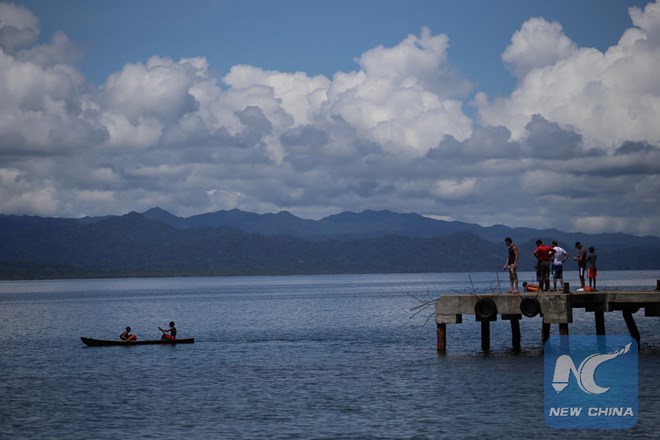
Wednesday, November 09, 2016
Migrants under health monitoring fish in the pier of a base of the National Borders Service (SENAFRONT) at Puerto Obaldia Village in the indigenous region of Guna Yala, Panama, Oct. 12, 2014. According to data from the SENAFRONT, at least 3,564 migrants of Caribbean countries and 282 ofAfrica have been found while crossing the Darien jungle from Colombia, heading to the U.S. in 2014. (Xinhua/Mauricio Valenzuela)
KAMPALA, Nov. 9 (Xinhua) -- Ministers in-charge of immigration in eastern Africa are scheduled to meet in Uganda this week to form a framework that will be used to address migration issues in the region.
Technocrats from the Intergovernmental Authority on Development (IGAD), a regional body that brings together eight member countries, are already meeting prior to the Wednesday ministerial meeting. IGAD brings together Djibouti, Eritrea, Ethiopia, Kenya, Somalia, South Sudan, Sudan and Uganda.
A statement issued by the IGAD Secretariat said the formation of a ministerial sectoral committee would propel migration higher within the political agenda of IGAD both regionally and internationally.
Globally, migration and displacement discussions have taken center stage following large movement of refugees and migrants.
Similarly, IGAD argues there should be a regional effort to create a more responsible, predictable system for responding to large movements of refugees and migrants.
"This calls for an urgent need to establish an IGAD Ministerial Committee on Migration in order to strengthen migration governance in the region," the IGAD statement said.
The ministerial meeting, which is the first of its kind regarding migration, comes in the wake of the heightened European Union (EU) refugee crisis. Many refugees who cross the Mediterranean Sea to Europe are said to come from Africa.
Eritrea is said to be the leading source of migrants to Europe, followed by Somalia, Ethiopia and Nigeria in Africa. According to the EU border control agency Frontex, in 2015 alone, 108,000 Africans made their way illegally to Europe, representing an increase of 42 percent over 2014.
Most of the migrants reported their nationality as Eritrean, although by regions, the majority of the migrants came from West Africa. They entered the Eurozone by crossing the Mediterranean with smugglers, mainly from Libya.
Internally, there are a lot of migrants. Ethiopia, Kenya and Uganda are among the top refugee hosting countries in Africa. Most of the refugees are from within the eastern Africa region itself.
Apart from forced migration due to conflict and repression, there are migrations due to natural calamities and the seasonal mobility of agro-pastoralist communities within the region and those seeking better opportunities in Europe, the Middle East, the U.S. and South Africa.
The German Chancellor Angela Merkel in her recent African tour that saw her go to Mali, Niger and Ethiopia said the stalling of the refugee influx into Europe cannot be possible without development.
She promised more development aid to reduce poverty that pushes more people from Africa to Europe.
Ali Abdi, the head of the International Organization for Migration here told Xinhua in a recent interview that the IGAD region can no longer put the issue of migration on the periphery.
He argued that to avoid the EU refugee crisis, countries in the region need to come up with a harmonized and consistent policy on migration governance and management.
"Right now the approach to migration is disjointed and adhoc, by bringing these countries together is an important step," he said.
He argued that although migration at times has ills like insecurity, it also has many positives that a country can reap from. He cited the case of Uganda where 4.3 percent of the country's Gross Domestic Product is as a result of remittance from Ugandans abroad.